#igboland
Text
The Igbo people (English: /ˈiːboʊ/ EE-boh,US also /ˈɪɡboʊ/ IG-boh; also spelled Ibo and historically also Iboe, Ebo, Eboe,Eboans,Heebo;natively Ṇ́dị́ Ìgbò) are an ethnic group in Nigeria. They are primarily found in Abia, Anambra, Ebonyi, Enugu, and Imo States. A sizable Igbo population is also found in Delta and Rivers States. Ethnic Igbo populations are found in Cameroon,Gabon, and Equatorial Guinea, as migrants as well as outside Africa. There has been much speculation about the origins of the Igbo people, which are largely unknown.Geographically, the Igbo homeland is divided into two unequal sections by the Niger River—an eastern (which is the larger of the two) and a western section.The Igbo people are one of the largest ethnic groups in Africa.

#african#afrakan#kemetic dreams#africans#brownskin#brown skin#afrakans#african culture#afrakan spirituality#Igbos#igbo culture#igboland#alaigbo#igbo#epic video
272 notes
·
View notes
Text


#african history#black culture#aesthetic#black art#black fashion#black history#tribal mask#igboland#pan african
19 notes
·
View notes
Text
3 notes
·
View notes
Text
Remembering Dr. Ogbonnaya Onu: A Visionary's Legacy
With profound sorrow and utmost respect, I join the Igbo communities around the globe and all Nigerians in honoring the memory of Dr. Ogbonnaya Onu, whose death was announced a few days ago. His departure has left an indelible mark on our hearts and the fabric of the nation he served so fervently and honorably.
Dr. Onu was celebrated for his brilliant mind and steadfast dedication to Nigeria’s…
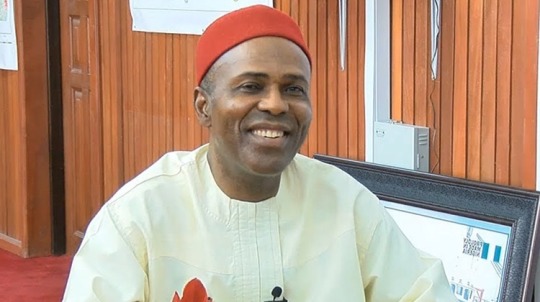
View On WordPress
#Abia State#Eulogy#igbo#Igboland#Ndigbo#Nigeria#Obituary#Ogbonnaya onu#Politics#Reflections#South East
0 notes
Text
Secret behind what is killing our young men today in Igboland. Okeite!
If you see any Yahoo boy spending money lavishly, this is what he’s into. Ordinary Yahoo no longer pays. To get big pay, they now go into this. The least an experienced native doctor can charge a person to prepare this charm is N1.5 million. Some native doctors charge as high as N3 million. Some don’t charge; what they do is collect a percentage of whatever you realize from time to time. Traders…

View On WordPress
1 note
·
View note
Text
"Peter Obi can only become President in Igboland, not in Nigeria" - Shettima
“Peter Obi can only become President in Igboland, not in Nigeria” – Shettima
Vice presidential candidate of the APC, Kashim Shettima, has said Peter Obi cannot become president of Nigeria.
According to the former Borno state governor, Obi the Labour party candidate can only be president of Igboland and not Nigeria.
“The Presidential Candidate of the Labour Party, Mr. Peter Obi has no political base and structure to win the next coming election in 2023. As far as i am…

View On WordPress
0 notes
Text
La Iniciación en la sociedad Igbo Cap.XXIII
#Igbo#Igbohistory#igboland#paisigbo#Biafra#antropología#antropologiasocial#historia#historiadeafrica#arte#tribal#tribalart#artetribalafricano#nigeria#Africa
0 notes
Text
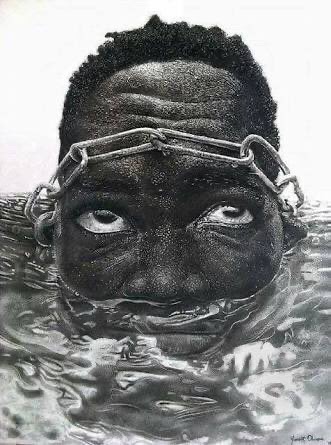

Igbo Landing is the location of a mass suicide of Igbo slaves that occurred in 1803 on St. Simons Island, GA.
In 1803 one of the largest mass suicides of enslaved people took place when Igbo captives from what is now Nigeria were taken to the Georgia coast. In May 1803, the Igbo and other West African captives arrived in Savannah, Georgia, on the slave ship the Wanderer.
During the voyage, approximately 75 Igbo slaves rose in rebellion, took control of the ship, drowned their captors, and in the process caused the grounding of the ship in Dunbar Creek.
The sequence of actual events is unclear as most of the historical incidence was passed down by oral tradition.
Under the direction of a high Igbo chief among them, walked in unison into the creek singing in the Igbo language "The Water Spirit brought us, the Water Spirit will take us home". They accepted the protection of their god Chukwu and death over the alternative of slavery.
The deaths signaled a powerful story of resistance as these captives overwhelmed their captors in a strange land, and many took their own lives rather than remain enslaved in the New World. The mutiny and subsequent suicide by the Igbo people was called by many locals the first freedom march in the history of the United States.
•••
El desembarque Igbo es un suceso de suicidio masivo de esclavos que se produjo en 1803 en la Isla de St. Simons en Georgia, Estados Unidos.
En 1803, uno de los suicidios masivos más grandes de personas eslavizadas se dio a cabo cuando un grupo de Igbos capturados de donde ahora es Nigeria, fueron llevados a las costas de Georgia. En mayo de 1803, los Igbo y otros africanos capturados llegaron a Savannah, Georgia en un barco de esclavos llamado The Wanderer.
Durante el viaje, alrededor de setenta y cinco Igbo se rebelaron, tomaron control del barco, ahogaron a sus captores y en el proceso vararon el barco en Dunbar Creek.
La secuencia actual de los eventos no es muy clara, debido a que la mayor parte de las incidencias históricas fueron pasadas por tradición oral.
Bajo las instrucciones de un alto sacerdote que se encontraba en el grupo, los Igbo caminaron juntos hacia el arroyo, cantando en su idioma: “El espíritu del agua nos trajo, el espíritu del agua nos llevará de regreso.” Aceptaron la protección de su Dios, Chukwu y también aceptaron la muerte como alternativa a la esclavitud.
Las muertes señalaron una historia poderosa de resistencia, estos esclavizados que superaron a sus captores en tierras extrañas y muchos quitándose la vida antes de querer vivirla como esclavos en el Nuevo Mundo. La rebelión y subsecuentemente, el suicidio de los Igbo, fue llamado por muchos de la población local, la primera marcha por la libertad en la historia de los Estados Unidos.
Source | Fuente: blackpast.org
Spanish translation by Long Live Blackness
Traducción al español por Long Live Blackness
#historyfacts#english#spanish#share#history#read#blackhistorymonth#blackhistoryyear#blacklivesmatter#blacklivesalwaysmatter#blackhistory#blackpeoplematter#knowledgeisfree#knowyourhistory#knowledgeispower#nigeria#igbolanding#nigerian history#igbohistory#Georgia#black history is american history#like#blackbloggers#ancestors#newpost#protest#freedom#weareblackhistory#united states#knowledge
91 notes
·
View notes
Text
Exploring Igbo ancestry: A basic guide for Black Americans, Afro-Caribbeans, Afro-Latinos, and others looking to connect with their Igbo roots
So, you’ve just received your DNA results and discovered that you are from the Igbo ethnic group in Nigeria – where do you begin?
Well, first of all, congratulations and welcome! Uncovering your ancestry is an exciting revelation that opens the door to a rich cultural heritage. Over the years, we’ve received messages from various individuals with questions about where to start, and we understand…

View On WordPress
#23andme#African american igbo#ancestry#igbo#Igbo diapora#Jamaican igbo#nigerian ancestry in america#red eboe#tracing igbo ancestry#where am I from in igboland
4 notes
·
View notes
Text
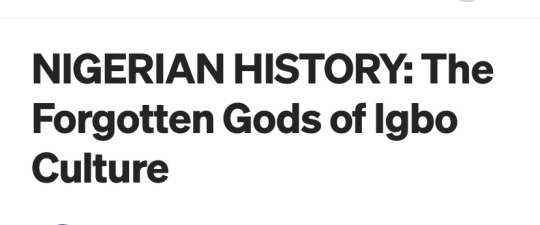
The black culture is not all about slavery
This is a message for my black brothers and sisters
There are more than 100 gods, both small and big, in Igbo Culture, but for some reason, most people don't know anything about them, except probably for one.I think colonialism and the entrance of Christianity are to blame because they made us forget our roots as Africans. But that's a narrative we must work hard to change.Out of the over 100 gods we have, I will be talking about the nine strongest and most popular Igbo gods (Alusi)
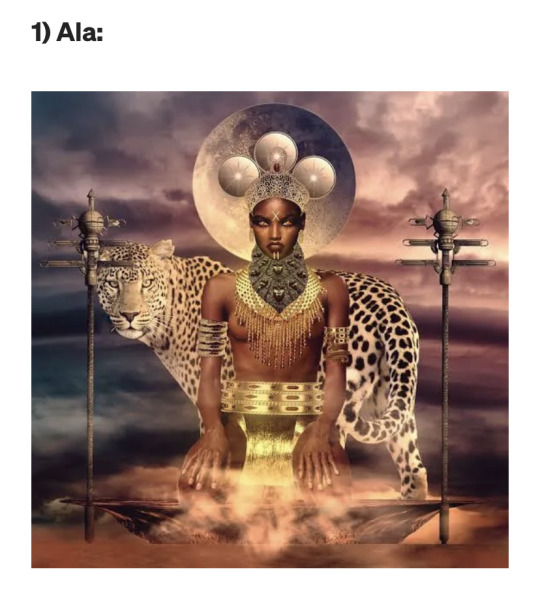
also known as ani, ana & ale in numerous dialects, is a female god representing the earth, fertility, creativity, and morality. She is the most respected god in Igboland.
She is considered the wife of Amadioha, the skygod, and commands authority in Igbo land. The symbol of the ala is a python & crescent moon
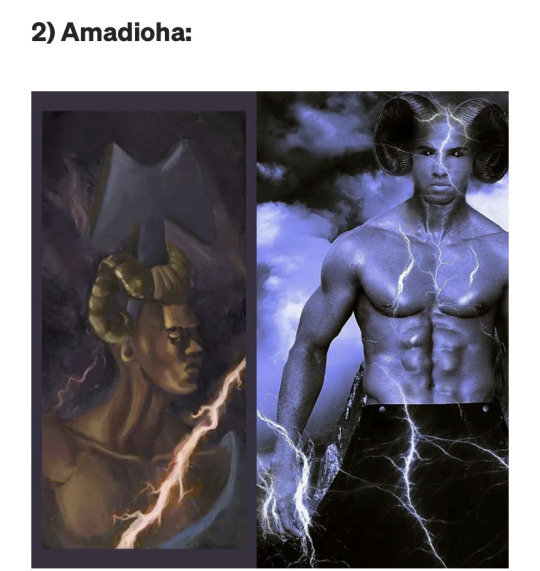
This is the most popular god in Igboland, and he is the god of thunder & lightning. He is the strongest of all.He is considered a gentleman among the deities and the cruelest when annoyed.Amadioha represents the collective will of the people. A white ram represents him, and his color is red. He is still one of the most feared gods in Igbo land to this day.His shrine can be found in rivers state, Nigeria.
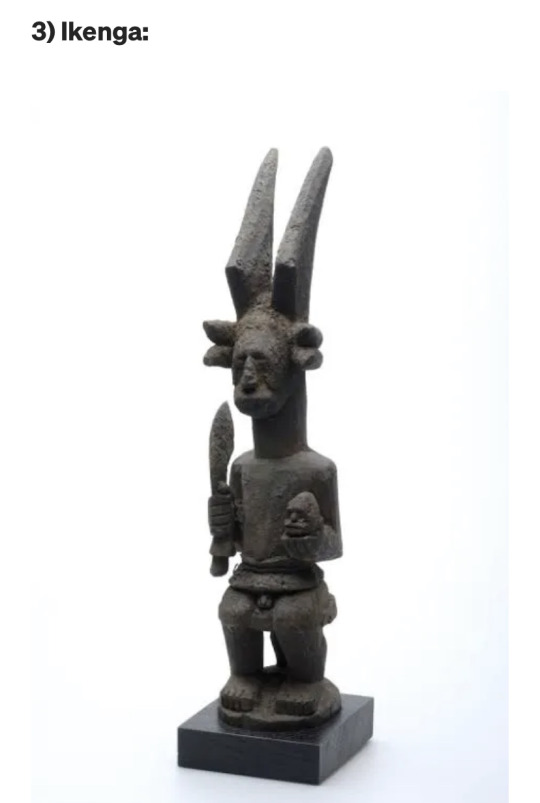
This is the god of strength and war, as its name means "place of strength." It is a horned deity and is one of the most powerful and respected gods in Igboland.The Ikenga can is given a title to men of good reputation, wealth, and integrity.
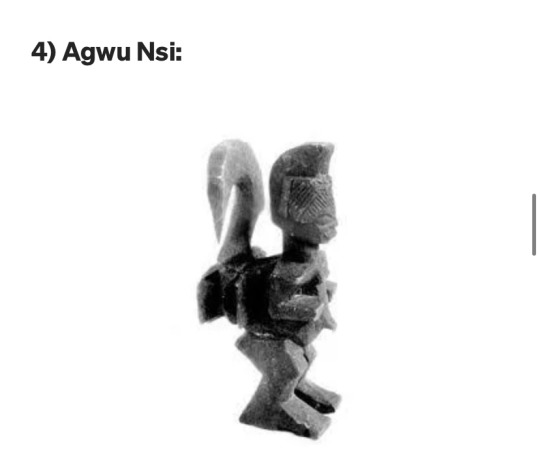
This is the god of health and divination. This god is one of the basic theological concepts used to explain good and evil, health and sickness, poverty, and wealth in Igbo land.Belief in the deity was widespread, with most villages having some agwu priests, who also doubled as physicians in the land.
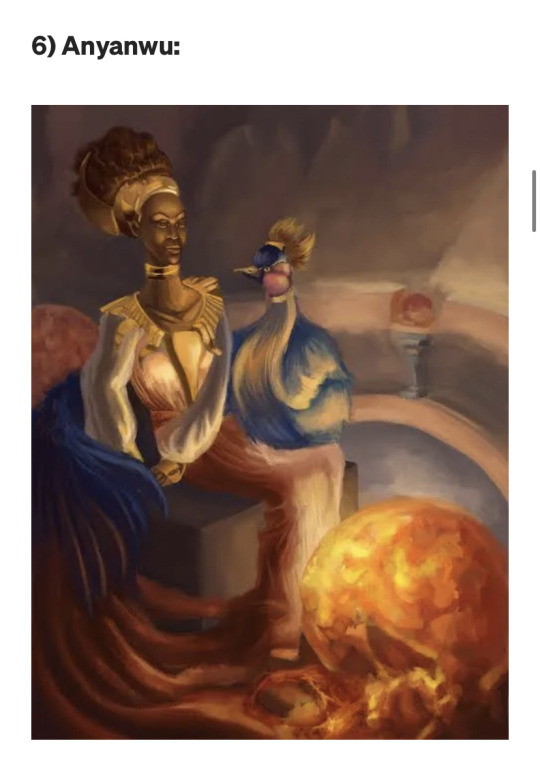
This is the goddess of the sun. As is done in almost all ancient religions and traditions, there is always a deity in respect of the sun.It is revered as the goddess that promotes productivity, hard work, and the overall positive well-being of the people.The Igbo kept this deity in high esteem. That's why many households took the name to be their surname.
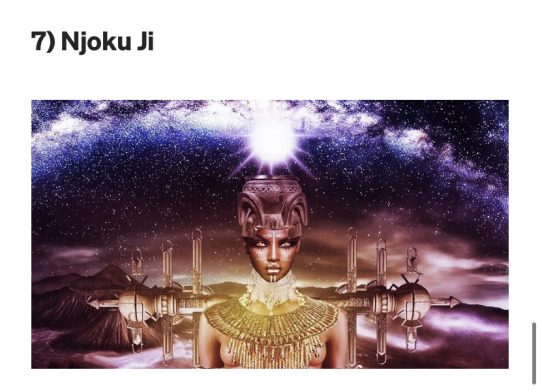
This is the guardian deity of yam in Igboland. (Yes, yams 😂)In many parts of Igbo land, people did rituals in honor of the goddess of yams, known as ifejioku.She is prayed to for productivity during the farming season.Children who were dedicated to this goddess were called Njoku and were expected to be prosperous in life
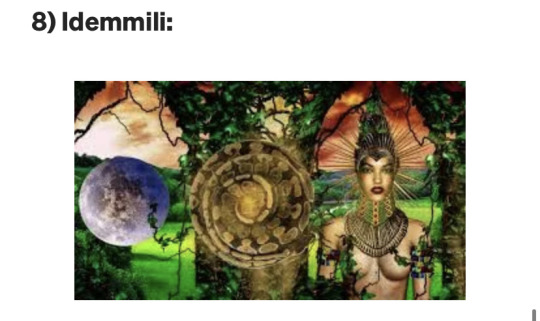
The goddess of the ocean & the seas. It is believed to have found the Idemmili community in Anambra state.Its shrine can be found in that community and is one of the oldest shrines in Igbo land.It is a secret shine & the worship of pythons (eke) goes on there. Hence the killing of pythons in that area is forbidden.
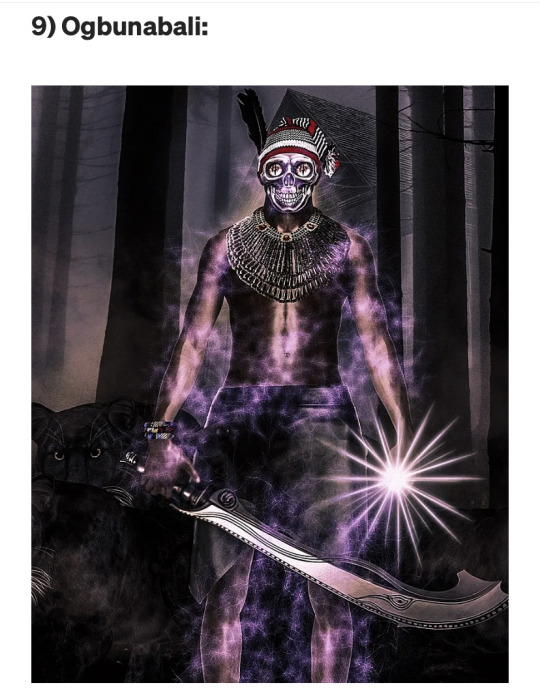
I don't think this list will be complete without a god of death.Meaning "the one that kills at night," he is known as the death deity.His victims are said to be criminals and those who have committed abominations in the land, and he is known to kill violently.
#life#animals#culture#aesthetic#black history#history#blm blacklivesmatter#anime and manga#architecture#blacklivesmatter#niger coup#blackawareness#black community
241 notes
·
View notes
Text
"For the people of precolonial Igboland, in the west of contemporary Nigeria, gender was a fundamental aspect of social organization. Land ownership was passed down through male relatives, but women worked the land and largely operated the subsistence economy, while men performed more ritual-oriented roles; industriousness was understood as an essentially female trait. Igbo society before the nineteenth century, then, had 'male' and 'female' social roles, but these roles weren't tied to anatomy or to gender assigned at birth. Instead, the gender of individuals shifted depending on their social role.
. . . The title of Ekwe was understood to attach itself to AFAB people through possession by the goddess Idemili, which first manifested itself as extraordinary good fortune: successful harvests, economic prosperity, and charisma that encouraged others to want to work for the person concerned. Once a person took the title of Ekwe, they were gendered male. This gender didn't manifest itself linguistically -Igbo pronouns are gender-neutral- but socially. Ekwe people could own land; they married women, including paying the 'child-price' for them, which enabled any children these wives bore to carry on the Ekwe family name; and they occupied important political positions within the local community.
People who did not bear the Ekwe title could also become male through marriage and land ownership. If a household was left without men -for example, if a husband died, leaving his wife and daughters as sole occupiers of the family's house and land -the family's continuing right to work the land depended on one of the children becoming a son. Like Ekwe people, these sons could marry one or more wives, and any children those wives had would bear their husband's family name. There was no assumption or expectation that the husband and wives would have a sexual or romantic relationship -and the husband's maleness was defined by social role, not by sexuality- though it must, of course, have provided an opportunity for women or AFAB people who did want to have sex or live as a romantic couple to do so.
To perform these social roles was, in precolonial Igbo culture, to be male. These men weren't obligated to modify their presentation in order to be treated as male: the position they occupied in society was enough. The social role and the gender were intrinsically entangled."
-Before We Were Trans: A New History of Gender by Kit Heyam
109 notes
·
View notes
Text
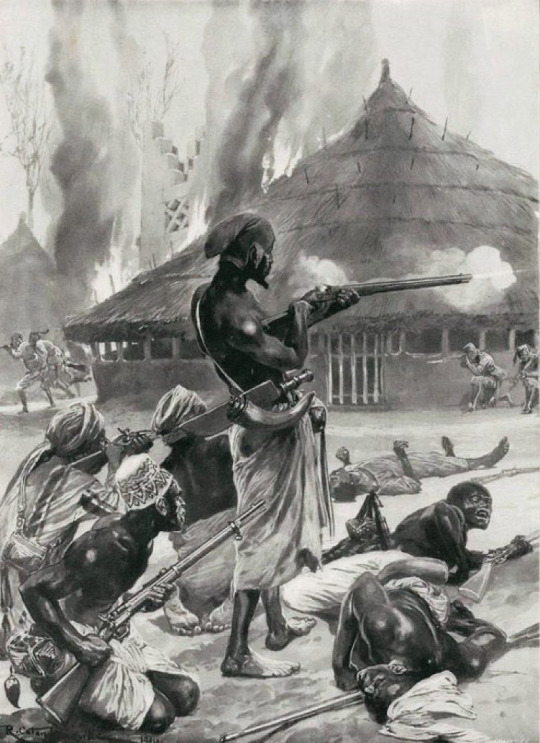
Aro Confederacy
The Aro Confederacy (1690–1902) was a political union orchestrated by the Aro people, Igbo subgroup, centered in Arochukwu in present-day southeastern Nigeria. The Aro Confederacy kingdom was founded after the beginning of the Aro-Ibibio Wars. Their influence and presence was all over Eastern Nigeria, lower Middle Belt, and parts of present-day Cameroon and Equatorial Guinea during the 18th and 19th centuries. The Arochukwu Kingdom was an economic, political, and an oracular center as it was home of the Ibini Ukpabi oracle, High Priests, the Aro King Eze Aro, and central council (Okpankpo). The Aro Confederacy was a powerful and influential political and economic alliance of various Igbo-speaking communities in southeastern Nigeria. It emerged during the 17th century and played a significant role in the region until the late 19th century.
The exact origins of the Aro Confederacy are not precisely documented, but it is believed to have been established around the mid-17th century. The Aro people, who were part of the Igbo ethnic group, inhabited the region around present-day Arochukwu in Abia State, Nigeria. They were skilled traders and missionaries who played a pivotal role in connecting various Igbo communities. This migration and their military power, and wars with neighboring kingdoms like supported by their alliances with several related neighboring Igbo and eastern Cross River militarized states (particularly Ohafia, Edda, Abam, Abiriba, Afikpo, Ekoi, Bahumono, Amasiri etc.), quickly established the Aro Confederacy as a regional economic power. The Aro Confederacy's strength came from its well-organized network of Aro agents who were dispersed across different communities in the region. These agents acted as intermediaries in trade, diplomacy, and religious matters. They facilitated commerce, resolved disputes, and spread the worship of the Aro deity known as the "Long Juju" oracle."The Opening Up of Nigeria, the Expedition Against the Aros by Richard Caton Woodville II" 1901
The "Long Juju" oracle was the spiritual centerpiece of the Aro Confederacy. It was housed in Arochukwu and considered a potent source of political authority and religious guidance. The Aro people used the oracle to enforce their influence and control over surrounding communities. It also served as a means to administer justice and settle disputes, often attracting pilgrims seeking solutions to their problems.
The Aro Confederacy gained significant economic power through trade and commerce Their economy was primarily based on agriculture, with the cultivation of crops like palm oil, yams, and cassava. They were also involved in trade with neighboring communities and European merchants. They controlled trade routes that passed through their territories, collecting tolls and taxes from traders. The Aro also engaged in the Trans-Atlantic slave trade by capturing and selling slaves to European traders.
Aro activities on the coast helped the growth of city-states in the Niger Delta, and these city states became important centres for the export of palm oil and slaves. Such city-states included Opobo, Bonny, Nembe, Calabar, as well as other slave trading city-states controlled by the Ijaw, Efik, and Igbo. The Aros formed a strong trading network, colonies, and incorporated hundreds of communities that formed into powerful kingdoms. The Ajalli, Arondizuogu, Ndikelionwu, and Igbene Kingdoms were some of the most powerful Aro states in the Confederacy after Arochukwu. Some were founded and named after commanders and chiefs like Izuogu Mgbokpo and Iheme who led Aro/Abam forces to conquer Ikpa Ora and founded Arondizuogu. Later Aro commanders such as Okoro Idozuka (also of Arondizuogu) expanded the state's borders through warfare at the start of the 19th century. Aro migrations also played a large role in the expansion of Ozizza, Afikpo, Amasiri, Izombe, and many other city-states. For example, Aro soldiers founded at least three villages in Ozizza. The Aro Confederacy's power, however, derived mostly from its economic and religious position. With European colonists on their way at the end of the 19th century, things changed.Burning of Arochukwu 1901
During the 1890s, the Royal Niger Company of Britain bore friction with the Aros because of their economic dominance. The Aro resisted British penetration in the hinterland because their economic and religious influence was being threatened. The Aro and their allies launched offensives against British allies in Igboland and Ibibioland. After failed negotiations, the British attempted to conquer the Aro Confederacy in 1899. By 1901, the tensions were especially intensified when British prepared for the Aro Expedition. The invasion of Obegu (in Igboland) was the last major Aro offensive before the start of the Anglo-Aro War. In November 1901, the British launched the Aro Expedition and after strong Aro resistance, Arochukwu was captured on December 28, 1901. By early 1902, the war was over, and the Aro Confederacy collapsed. Contrary to the belief that the Ibini Ukpabi was destroyed, the shrine still exists, and is intact in Arochukwu and serves mainly as a tourist site.

#african#afrakan#kemetic dreams#africans#afrakans#brown skin#brownskin#african culture#afrakan spirituality#arochukwu#anglo aro war#obegu#igboland#ibibioland#igbo#igbo culture#british#long juju#aro confederacy#confederacy#nigerian#cameroon
26 notes
·
View notes
Text
today i volunteered for service hours and i got told by the person i emailed who’s in charge that they didn’t know what gender i was via email as my (dead) name is african (i do still have an african preferred name, but i mostly go by scott), and it made me think of how being african functions so much like a gender.
A lot of African names are gender neutral, and traditionally, genderfluidity and gnc gender roles were norm of numerous African societies.
Black people tend to be seen as simultaneously hypermasculine and hyperfeminine. Black women especially are seen as masculine with stereotypes assigned such as angry, strong, sassy, loud, etc, adding feul to the fire as they are often seen as “men’s” traits. This doubles if they’re of another marginalized identity.
Black men are often treated as extremely dangerous, marking a subpar masculinity, yet are also seen as incompetent, submissive, and unintelligent, traits often seen as “women’s” traits. Black fat little boys especially tend to be mistaken for girls.
Especially being African or being in a family of recent immigrants as a black person, ypur femininity or masculinity is put up to the question as many things about you could tick bells for untraditional western gender roles: cultural roles in your family, your accent, your clothing, food, body type, ethnic features, way of approaching life, etc.
We get it drilled in early that we are not society’s gender standard and must assimilate into western gender dichotomy or risk being seen as vermin. Many africans today don’t even realize how atypical the lifestyle of “men as breadwinners, women in the house” is.
In igbo culture (as Im igbo), there were numerous gender roles one could fill. If one wanted a sister but got a brother instead, the brother would fill the role as the sister or vice versa. I have also heard of an aunt shortly after the nigerian war in a relationship with another woman and one of them filling the role of the father, with them consensually mating with other men to have a child. There’s more of course, but igbo culture used to be especially women centric and centered dominace as a trait for women. Nowadays, women are at the backdoor as igboland assimilates into the western world and becomes more male centric. it’s worth noting the language igbo does not have an equivalent for he/she pronouns.
Trends with the types of names assigned in a given culture can tell us a lot about how gender functions in society and how a certain identity can function as such
30 notes
·
View notes
Text

@d0ggr-4tt3zz
I don't really read novels because I'm a pretty slow reader, and also reading is pretty taxing for me (I am probably dyslexic, both my parents and my sister are, but I've never been tested), so novels aren't exactly a good leisure activity. I have read one novel that I enjoyed though, Things Fall Apart by Chinua Achebe. I liked the straightforward, realist prose style, and found the image that Achebe painted of pre-colonial Igboland very compelling. On the opposite end of the spectrum, I like HP Lovecraft a lot, which is nominally horror but I've never found his stories scary in the slightest. I just like the imagery.
I actually think this is the main commonality in the prose that I like—I enjoy imagery more than action, and both Lovecraft and Achebe set a scene very well, I think.
Let's see, what other kind of art do I like...
Well, when it comes to visual art, you can just look in my #aestheticposting tag.
I don't consume a lot of fiction in general. I think I like fiction noticeably less than the average person, and way less than the average tumblr user.
Among TV shows that I have liked: The X-Files, Spice and Wolf, Gilmore Girls, Fullmetal Alchemist: Brotherhood, Foyle's War, Bocchi the Rock. If you can find any essential commonality between these, please do let me know what it is.
I do think my taste in art/media/fiction has a certain coherency to it, but it's hard to put into words. For the most part I don't really like bombast or high drama. I don't know exactly.
13 notes
·
View notes
Text
Reclaiming the Legacy - Restoring Integrity and Unity in Ohanaeze Ndigbo - A Call to Action
Ohanaeze Ndigbo, once a bastion of dignity within the Igbo community, now faces a crisis of identity and purpose. The organization’s noble mission has been undermined by leaders whose ascent was marked by cunning rather than capability, leading to ineffective governance and a loss of public trust.
This shift from esteemed institution to a subject of derision signals deep-rooted issues within…

View On WordPress
#2024#CULTURE#democracy#development#disharmony#History#igbo#IGBO TRADITION#Igboland#mismanagement#Ndigbo#Ndigbo Lagos#Ndubuisi Kanu#Nnia Nwodo#Ohanaeze#Ojukwu#South East#South-South#Southern Nigeria#Tradition#tradition and culture
0 notes
Text
"cultures are meant to be shared" no they're not. Not one of my ancestors designed the igbo language or practiced our religion or made the cultural standards they did because someone some day would step their crusty pale foot into igboland and demand entrance
That sentiment just highlights how entitled people are because what do you mean you think you have a right to other people's cultures? No matter what's going on? Have you heard of closed cultures? Every single culture is designed and practiced with its own members in mind. They're never made for the benefit of others. What the hell. So if I bar one of y'all annoying asses from parts of my culture now I'm depriving you of something?
14 notes
·
View notes